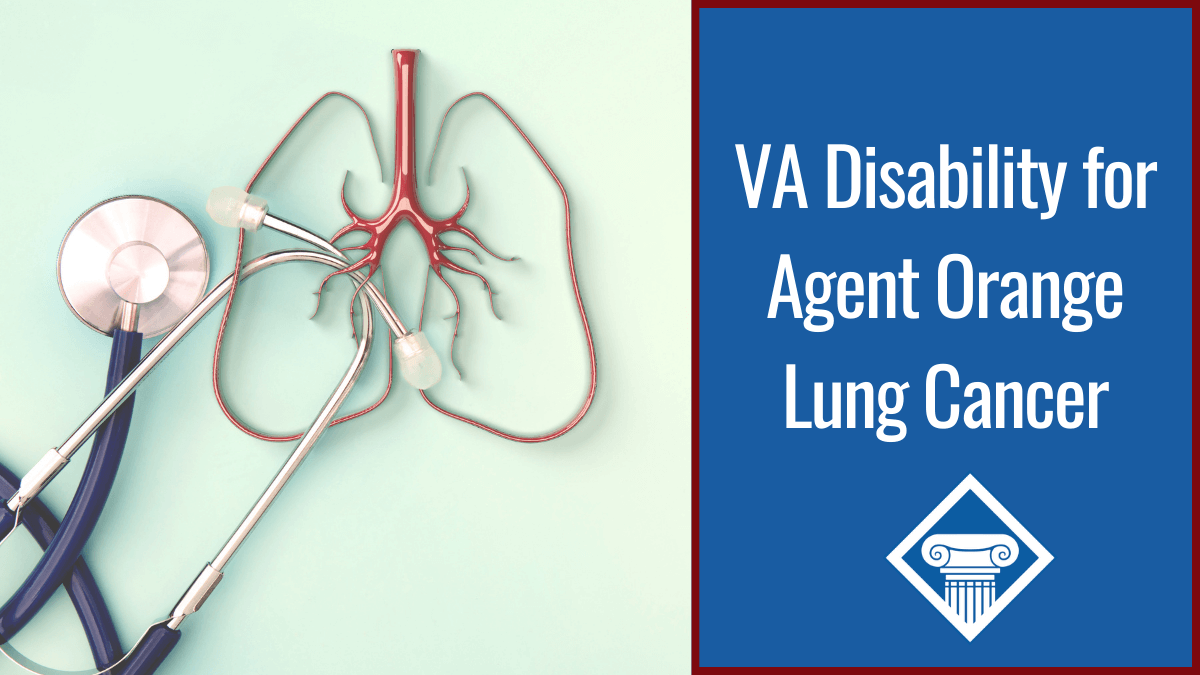If you were exposed to Agent Orange during your military service and developed lung cancer, you’re likely eligible for VA disability benefits. Read this post to learn more about the connection between Agent Orange and lung cancer.

Let’s get started today
You were one of the millions of veterans exposed to Agent Orange during your military service. Now, you’ve been diagnosed with lung cancer. Because of exposure to the toxin, you’re eligible for 100% VA disability benefits for at least six months, and you may be eligible for additional benefits afterward. We explain more below.
In this article about Agent Orange and lung cancer:
What is Agent Orange?
Agent Orange was a chemical herbicide the military used to remove leaves from trees and plants in many locations, including military bases, beginning in the ‘60s. The military widely used Agent Orange during the Vietnam War. Agent Orange was stored on U.S. soil, and soldiers were also exposed to it on Navy ships and Air Force planes.
The herbicide contained a deadly chemical, dioxin, which is a carcinogen, meaning it can cause cancer. Today, many veterans who were exposed to Agent Orange are experiencing serious physical, psychological, and neurological health issues, leading the VA to provide many presumptive disability benefits for Agent Orange exposure.

Qualifying for an Agent Orange lung cancer presumptive
Lung cancer is one of the health conditions on the VA’s presumptive list for Agent Orange exposure. This means that if you served in qualifying locations and time periods and develop lung cancer, you don’t need any additional evidence to establish your service is the cause of your lung cancer. The presumptive service connection means the VA has already established the tie between the two.
Veterans who are presumed to have been exposed to Agent Orange are those who served in:
- Vietnam: On land and some vessels between Jan. 9, 1962, and May 7, 1975. This exposure includes those stationed on Blue Water Navy ships.
- C-123 Airplanes: You served in an Air Force unit location where a C-123 aircraft with traces of Agent Orange was assigned, and had repeated contact with this aircraft.
- Korea: In or near the demilitarized zone (DMZ) between Sept. 1, 1967, and Aug. 31, 1971
- Thailand: Any U.S. or Royal Thai military base between Jan. 9, 1962, and June 30, 1976
- Herbicide Test Sites and Storage: This exposure may have occurred at military bases in the U.S. or other countries, and also includes veterans who transported Agent Orange.
- Laos: Between Dec. 1, 1965 and Sept. 30, 1969
- Cambodia: At Mimot or Krek, Kampong Cham Province between April 16, 1969 and April 30, 1969
- Guam or American Samoa (or in the territorial waters): Between Jan. 9, 1962 and July 31, 1980
- Johnston Atoll (or on a ship that called at Johnston Atoll): Between Jan. 1, 1972, and Sept. 30, 1977
Reservists also have additional locations and service periods that can qualify them.
If your service qualifies and you have lung cancer, your claim could benefit from an Agent Orange lung cancer presumptive.
VA rating for lung cancer caused by Agent Orange
The VA provides disability benefits for various respiratory conditions and types of cancers. The VA rates lung cancer using diagnostic code 6819 in the Schedule of Ratings for malignant neoplasms of the respiratory system. This rating provides for 100% disability for the duration of the illness and treatment, plus six months after any “surgical, X-ray, antineoplastic chemotherapy or other therapeutic procedure.”
After six months, you will receive another VA exam to determine if there are residual issues and receive a new rating based on those. We explain some of the more common residuals and secondary complications of lung cancer and its treatments below.
Secondary and residual lung cancer issues
A variety of residual health conditions that may qualify for VA disability benefits can result from lung cancer and its forms of treatment. These side effects, which can occur during, immediately after, or in months and years that follow treatment, include:
- Mental health issues, like depression or anxiety, resulting from being diagnosed with cancer and having to undergo the stress of treatment
- Heart disease, as some cancer treatments can negatively impact the heart
- Hearing loss or tinnitus caused by chemo, radiation, or medications used to treat lung cancer
- Sleep problems especially due to pain or medications
- Eye conditions, like changes in vision, swelling, or irritation, or the development of cataracts or glaucoma, resulting from treatment or medication
- Other cancers because certain types of treatment can increase your risk of developing other types of cancer
If you develop any of these health conditions during or after lung cancer treatment, they could be related, making them eligible for VA disability benefits as residual or secondary conditions.
I highly recommend this company. They were able to get my husband the disability rating the VA kept denying.

L.C., an Army veteran’s spouse in California
From a Google review for Woods & Woods
TDIU for lung cancer
A veteran may be awarded total disability based on individual unemployability (TDIU) for Agent Orange lung cancer and its residuals. TDIU is also known as individual unemployability or simply IU. Veterans are eligible for these benefits if they can’t hold down “substantially gainful” employment due to their service-connected conditions.
Veterans who receive TDIU benefits are compensated at the same level as those with a 100% disability rating, even though their combined rating is below 100%.
Veterans who develop lung cancer after being exposed to Agent Orange will likely be unable to work throughout most of their treatment. If they experience secondary issues like mental health conditions and sleep problems because of the cancer or its treatments, this can, in some cases, make going back to work difficult if not impossible. Other possible residuals like hearing loss and heart disease could create additional serious, disabling complications.
Veterans will typically be eligible for TDIU if they have:
- At least one service-connected disability rated at 60% or more disabling OR
- Two or more service-connected disabilities with at least one rated at 40% or more disabling and a combined rating of 70% or more
How Woods & Woods can help
Our team of VA-accredited attorneys, legal analysts, case managers, and intake specialists help veterans nationwide get the benefits they deserve. If you’re tired of appealing one VA decision after another, call us today for a free case evaluation.
Don’t fight the VA alone

Frequently asked questions
Yes, exposure to Agent Orange can cause various lung problems, including lung cancer. Lung cancer is on the VA’s presumptive condition list for Agent Orange exposure. This means the agency has established a clear connection between the conditions and exposure to Agent Orange, and it does not require a veteran to prove their lung cancer was caused by exposure to the herbicide.
Yes, you can get VA disability for lung cancer if you weren’t exposed to Agent Orange. However, unlike those exposed to Agent Orange, you will need to prove a connection between the cancer and your military service.





